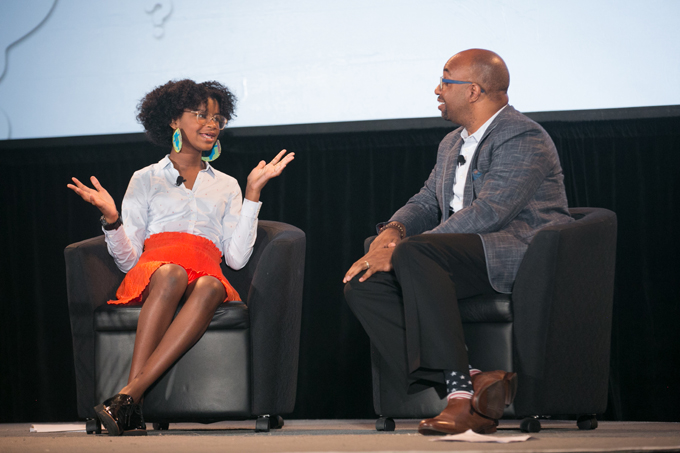
If we learned anything at the ILA 2018 Conference, it’s that changemaking work is fueled by two feelings: hope and frustration. This year’s theme, Be a Changemaker, was about identifying a problem, and finding the tools, connections, and strategies needed to drive a solution.
And there’s perhaps no greater harbinger of hope than 14-year-old Marley Dias, the face of the next generation of changemakers.
The inaugural Children’s Literature Day opened with a message of hope when Dias took the stage to deliver the opening keynote. Dias reflected on how she turned her frustration about the books she was seeing in school, which offered no mirrors but rather windows that “only opened up to one place and one type of experience”—that of white boys and their dogs—into a movement. She started the #1000BlackGirlBooksProject, a campaign to collect 1,000 books with black girl protagonists that she would then donate to libraries around the country.
“That singular and exclusive experience frustrated me, and I decided to do something about it,” she said.
She has since collected more than 12,000 books, appeared on the Ellen Show, interviewed Hillary Clinton, and written her first book,
Marley Dias Gets It Done. Dias spoke about the importance of diverse books, inspiring activism in young people, and embracing difference.
“Reading allows us to see the humanity in others who are not like us,” she said. “Embracing difference is essential if you want to be a changemaker.”
“Each of us has a magic inside of us that we can use to make the world a better place.”
The New York Times bestselling-author Kwame Alexander joined her onstage for a Q&A session that was equal parts funny and poignant. The two discussed their new books, their shared love of poetry, and the age-old war between Nigerian and Ghanaian
jollof rice.
Attendees then dispersed for the morning session of author meetups, panels, and signings. Four categories of meetups (Early Reader, Middle Grade, Early Young Adult, and Older Young Adult) featured a mix of up-and-comers and well-established veterans, including Megan McDonald, Carole Boston Weatherford, and Peter H. Reynolds.
During a
new event, the Latinx panel, moderator Oralia Garza de Cortés, cofounder of the American Library Association's Pura Belpré Award, lead a discussion with four authors whose works celebrate Latinx family culture. They tackled questions of identity and stereotyping, authentic cultural voice, and “the single story.”
After attendees reconvened at noon for a formal lunch, former ILA Board member Julie Scullen took the stage next to present the ILA Children’s and Young Adults’ Book Awards. Following was a keynote by fifth-grade teacher and Nerdy Book Club founder Colby Sharp, who made the audience laugh and cry as he shared videos from his mock Caldecott unit, which showed students’ celebratory cries and looks of defeat when the actual award winners were announced.
He spoke about how to inspire a lifelong love of reading in young people, the value of family and community engagement; and the importance of leading by example.
“We have a responsibility to make sure a kid never feels like a level, to make sure kids feel like readers, and to make sure kids have all the books,” he said.
After an afternoon of more meetups, panels, and signings, Alexander returned to the stage to deliver a dynamic closing keynote. He recited original poetry and shared videos of his first poetry workshop held in a juvenile detention center, an experience that showed him how language can empower and effect change.
Alexander brought the message of hope full circle when he shared the fruits of his own changemaker work: the Literacy Empowerment and Action Project, a health clinic and library in the rural village of Konko, Ghana, that facilitates student scholarship opportunities, literacy training for teachers, girls’ empowerment workshops, and career development projects. He closed ILA 2018 on an inspiring note.
“Read the change. Be the change. Share the change. Make the change.”
Alina O’Donnell is the communications strategist at ILA and the editor of Literacy Daily.